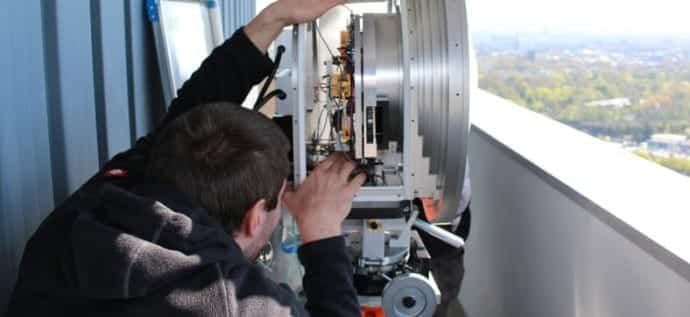German scientists transmit data at a world record 6 Gigabit per second over a distance of 37 Kms
They say nothing is impossible for humans and scientists from Germany have proved it by achieving world record data transmission speeds ten times faster than what has been achieved so far.
Researchers from the University of Stuttgart, the Karlsruhe Institute of Technology (KIT) and the Fraunhofer Institute for Applied Solid State Physics IAF, achieved a new world record in wireless data transmission by sending the contents of a conventional DVD in under ten seconds using radio waves. In other words, they have set a new record in wireless transmission using millimetre-waves to transmit at a data rate of 6 Gigabit per second over a distance of 37 kilometers, which is 10 times faster than any data transmission method.
The extremely high data rates of 6 Gbit/s was accomplished through efficient transmitters and receivers at a radio frequency of 71-76 GigaHertz in the so-called E band of the electromagnetic spectrum, regulated for terrestrial and satellite broadcasting.
This was part of collaborative project ACCESS (Advanced E Band Satellite Link Studies) carried out by a research group headed by Ingmar Kallfass from the Institute of Robust Power Semiconductor Systems (ILH) from the University of Stuttgart, the Institut für Hochfrequenztechnik und Elektronik (IHE) from KIT, Radiometer Physics GmbH, and the Fraunhofer Institute for Applied Solid State Physics IAF.
During the experiment, the researchers sent data between Cologne’s 45-story Uni-Centre and the Space Observation Radar TIRA located at Fraunhofer Institute for High-Frequency Physics and Radar Techniques in Wachtberg some 37km away. To achieve the high data rates together with the unprecedented distance, the researchers built innovative transmitters and receivers complete with powerful signal amplifiers. The transistor-based devices together form what the researchers call monolithically integrated millimetre-wave circuits (MMICs).
During the experiment, the researchers sent data between Cologne and the 36.7 km distant town of Wachtberg. The stations were located on the 45-story Uni-Center in Cologne and the site of the Space Observation Radar TIRA at the Fraunhofer Institute for High Frequency Physics and Radar Techniques FHR in Wachtberg. The researchers built innovative transmitters and receivers complete with powerful signal amplifiers to achieve the high data rates combined with the exceptional distance. The transistor-based devices together form what the researchers call monolithically integrated millimetre-wave circuits (MMICs).
The circuit increases the broadband signal to a transmission power of 1W with the help of power amplifiers based on gallium nitride (GaN). The signal is then transmitted via a highly directive parabolic antenna and consequently received at the other station. The sensitive receivers equipped with low-noise amplifiers can constantly detect it, even though it has faded considerably during the transmission.
Radio transmission of high amounts of data over great distance serves many important application areas. For instance, the next generation of satellite communication requires an ever-increasing data offload from earth observation satellites down to earth. The advance would make supplying fast internet to rural areas and remote regions possible. About 250 Internet connections can be supplied with 24 Megabit per second, researchers said.
Terrestrial radio transmissions in the E-band are suitable as a cost-effective replacement for the deployment of optical fiber or as ad-hoc networks in the case of disasters and catastrophe, and for connecting base-stations in the backhaul of mobile communication systems.
The primary goal of the research project, called ACCESS, is to enhance satellite data transmission. However, the technology could also work in terrestrial conditions, potentially providing fibre-optic-level data speeds without the need to lay cables and build costly infrastructure.
The project, which was funded by Germany’s Federal Ministry for Economy and Energy (BMWi), is devoted to make satellite internet connections faster, as well as enhance terrestrial wireless internet.
